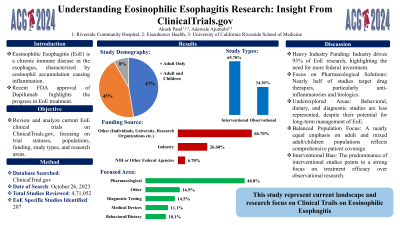Monday Poster Session
Category: Esophagus
P2193 - Understanding the Current State of Eosinophilic Esophagitis Research: Insights from ClinicalTrials.gov
Monday, October 28, 2024
10:30 AM - 4:00 PM ET
Location: Exhibit Hall E

.jpg)
Akash Patel, MD
Eisenhower Medical Center, Riverside Community Hospital
Palm Desert, CA
Presenting Author(s)
Akash Patel, MD1, Adewale Ajumobi, MD, FACG2
1Eisenhower Medical Center, Riverside Community Hospital, Palm Desert, CA; 2Eisenhower Health, Rancho Mirage, CA
Introduction: Eosinophilic Esophagitis (EoE) has recently gained prominence in clinical research. This heightened attention is notably marked by the FDA's groundbreaking approval of Dupilumab, the first and only specific treatment for EoE. In response to these developments, this study seeks to conduct a comprehensive analysis of clinical trials on Eosinophilic Esophagitis registered on ClinicalTrials.gov. The analysis encompasses various elements, including the current status of these trials, the populations targeted, sources of funding, types of research conducted, and the specific subtopics within EoE under active investigation.
Methods: A search was performed on ClinicalTrials.gov on October 26, 2023, resulting in the identification of 207 studies specifically dedicated to EoE from a total of 471,052 registered studies. The studies were categorized based on their status, targeted population, funding source, type (interventional or observational), and focus within the domain of EoE.
Results: Of the 207 EoE studies, 49.3% were completed, and 31.9% are ongoing. A balanced distribution was observed in the targeted populations, with 47.3% focused on adults only and 44.4% involving both adults and children. Only a minority (6.8%) were funded by the National Institute of Health (NIH) or other federal organizations. The majority (93.2%) were funded by industries, individuals, or other research organizations. Interventional studies constituted the majority, at 65.7%, while observational studies made up 34.3%. Among all the studies, 48.8% were primarily focused on pharmacological approaches, 10.1% on behavioral and dietary strategies, 11.1% on medical devices and technology, and 14.5% on diagnostic testing methods. Specific areas of focus within pharmacological approaches included Anti-inflammatory medications and steroids (34.7%), biological medications (28.7%), and novel experimental drugs (25.7%).
Discussion: The landscape of EoE research is diverse, but heavily leans towards interventional studies, especially those exploring pharmacological interventions. The data also highlights an underrepresentation of federally funded research in the field. Given the prevalence of ongoing studies, this analysis serves as a valuable resource for clinicians, researchers, and policymakers engaged in EoE research and treatment.
Disclosures:
Akash Patel, MD1, Adewale Ajumobi, MD, FACG2. P2193 - Understanding the Current State of Eosinophilic Esophagitis Research: Insights from ClinicalTrials.gov, ACG 2024 Annual Scientific Meeting Abstracts. Philadelphia, PA: American College of Gastroenterology.
1Eisenhower Medical Center, Riverside Community Hospital, Palm Desert, CA; 2Eisenhower Health, Rancho Mirage, CA
Introduction: Eosinophilic Esophagitis (EoE) has recently gained prominence in clinical research. This heightened attention is notably marked by the FDA's groundbreaking approval of Dupilumab, the first and only specific treatment for EoE. In response to these developments, this study seeks to conduct a comprehensive analysis of clinical trials on Eosinophilic Esophagitis registered on ClinicalTrials.gov. The analysis encompasses various elements, including the current status of these trials, the populations targeted, sources of funding, types of research conducted, and the specific subtopics within EoE under active investigation.
Methods: A search was performed on ClinicalTrials.gov on October 26, 2023, resulting in the identification of 207 studies specifically dedicated to EoE from a total of 471,052 registered studies. The studies were categorized based on their status, targeted population, funding source, type (interventional or observational), and focus within the domain of EoE.
Results: Of the 207 EoE studies, 49.3% were completed, and 31.9% are ongoing. A balanced distribution was observed in the targeted populations, with 47.3% focused on adults only and 44.4% involving both adults and children. Only a minority (6.8%) were funded by the National Institute of Health (NIH) or other federal organizations. The majority (93.2%) were funded by industries, individuals, or other research organizations. Interventional studies constituted the majority, at 65.7%, while observational studies made up 34.3%. Among all the studies, 48.8% were primarily focused on pharmacological approaches, 10.1% on behavioral and dietary strategies, 11.1% on medical devices and technology, and 14.5% on diagnostic testing methods. Specific areas of focus within pharmacological approaches included Anti-inflammatory medications and steroids (34.7%), biological medications (28.7%), and novel experimental drugs (25.7%).
Discussion: The landscape of EoE research is diverse, but heavily leans towards interventional studies, especially those exploring pharmacological interventions. The data also highlights an underrepresentation of federally funded research in the field. Given the prevalence of ongoing studies, this analysis serves as a valuable resource for clinicians, researchers, and policymakers engaged in EoE research and treatment.
Disclosures:
Akash Patel indicated no relevant financial relationships.
Adewale Ajumobi indicated no relevant financial relationships.
Akash Patel, MD1, Adewale Ajumobi, MD, FACG2. P2193 - Understanding the Current State of Eosinophilic Esophagitis Research: Insights from ClinicalTrials.gov, ACG 2024 Annual Scientific Meeting Abstracts. Philadelphia, PA: American College of Gastroenterology.
